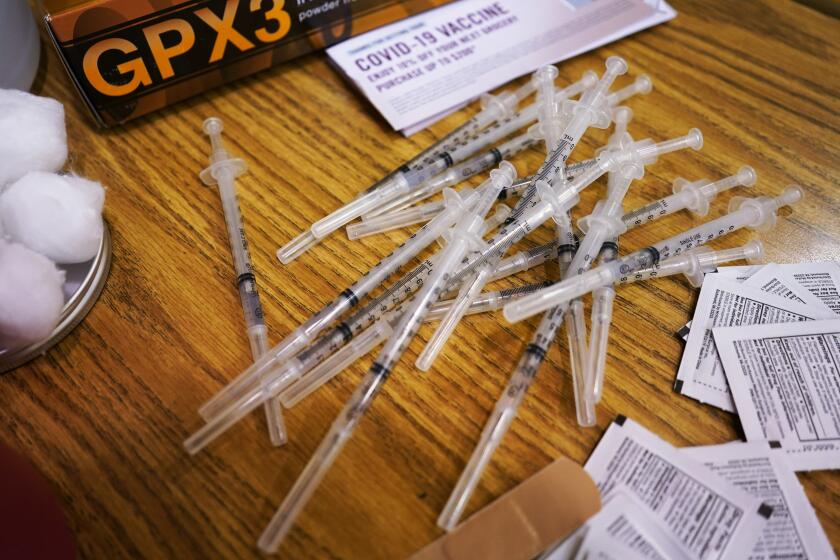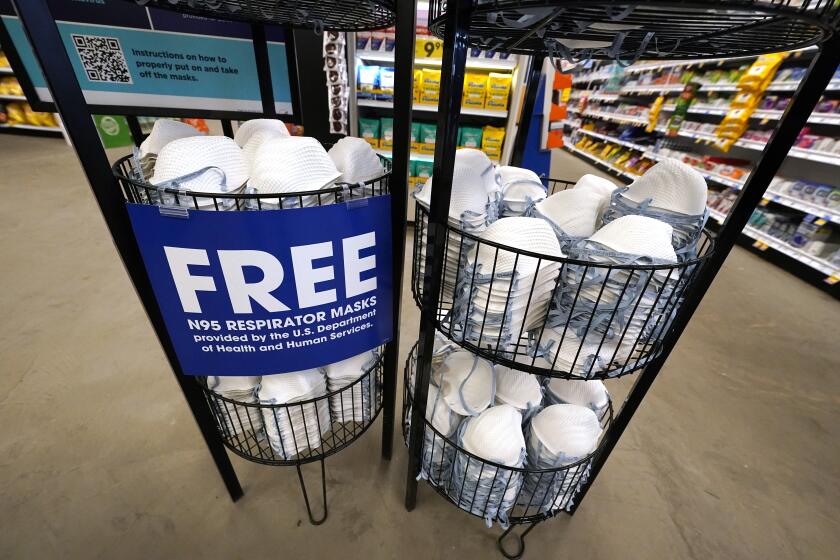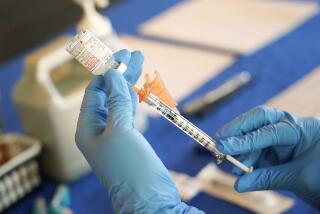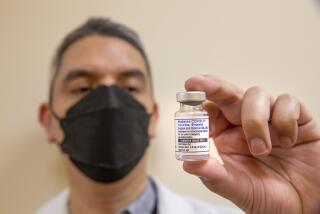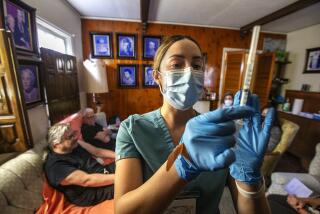Second COVID booster shot does little to stop Omicron, study finds
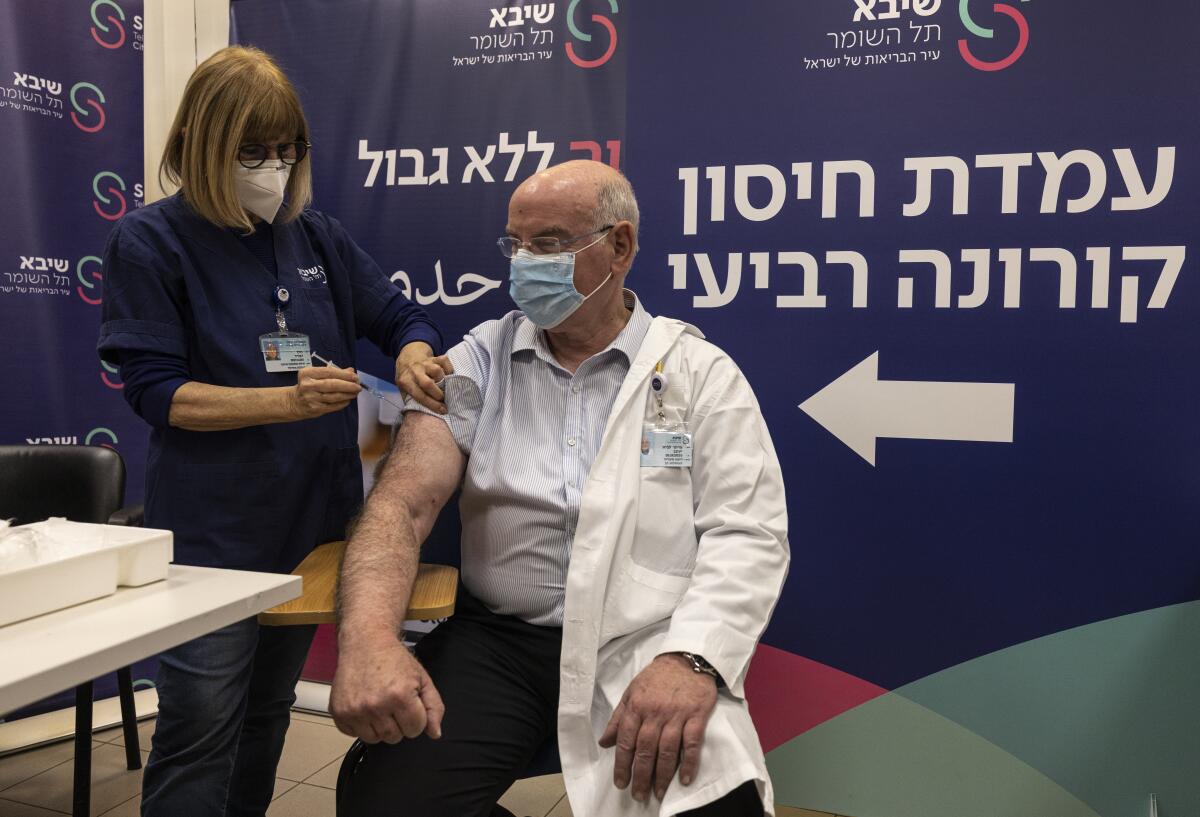
Israeli healthcare workers who were boosted with a fourth shot of COVID-19 vaccine at the height of the Omicron wave were only marginally more protected against reinfection than their peers who had received three jabs of vaccine, researchers reported Wednesday.
Compared to getting two initial doses and one booster shot of Pfizer and BioNTech’s Comirnaty vaccine, adding a second booster shot reduced the rate of coronavirus infection by just 30%.
The fourth dose was somewhat more effective at preventing COVID-19 symptoms, according to a study published in the New England Journal of Medicine. The healthcare workers who got the second booster shot were 43% less likely to show signs of illness than were those who hadn’t.
Using Spikevax, Moderna’s COVID-19 vaccine, as a second booster shot was even less effective at preventing coronavirus infections in this group of younger, generally healthy Israelis. Recipients were only 11% less likely than those who had gotten three doses of vaccine to be reinfected during Israel’s Omicron wave, and they were 31% less likely to suffer symptoms of COVID-19.
The benefits of a second booster shot were small to begin with. But they were even smaller in light of how effectively three doses of vaccine had reduced the impact of a coronavirus infection to a mere nuisance.
Whether they had had three or four doses of COVID-19 vaccine, most of the Israeli doctors and nurses who took part in the new study and then became infected “reported negligible symptoms,” the study authors noted. That means the practical benefits of a fourth dose would scarcely have been noticeable in the study’s population of 821 people.
The researchers also observed that those who got a fourth dose and subsequently became infected had “relatively high viral loads.” That suggests that the added booster had done little to curb their ability to transmit the virus to others.
“A fourth vaccination of healthy young health care workers may have only marginal benefits,” the Israeli researchers concluded. The extra shot reliably boosted coronavirus antibodies, but the protective value of the mRNA vaccines appears to have been achieved by three doses, they added.
The newly published study comes a day after Pfizer asked the Food and Drug Administration to authorize a second booster shot for Americans 65 and older.
The Food and Drug Administration and the Centers for Disease Control would have to approve the request for an additional COVID-19 booster dose for seniors.
In doing so, Pfizer cited the results of two unpublished Israeli studies.
In a press release announcing its application to the FDA, Pfizer said an analysis of Israeli medical records showed that the rate of confirmed infections in people 60 and older who received a second booster was half that seen in their counterparts who had had only three doses of the vaccine. In addition, the likelihood of developing severe COVID-19 was four times lower in the group that got a second booster, the company said.
Pfizer’s FDA application also included results of an unspecified clinical trial in which it offered a second booster shot to Israeli healthcare workers who wanted it. Among the 154 workers who got the fourth shot, neutralizing antibodies rose by a factor of seven to eight, and antibodies specific to the Omicron variant increased by a factor of eight to ten, Pfizer said.
While the study design and names of researchers conducting the trial are unclear in Pfizer’s press release, these findings appear to reflect a segment of the population that was the subject of Wednesday’s New England Journal of Medicine study.
If the U.S. public health emergency ends, Americans would be vulnerable to a new coronavirus variant that sparks another COVID-19 surge.
As vaccine experts await a fuller account of the data cited by Pfizer, they pointed to the newly published Israeli study as evidence that any discussion of second-booster-for-all is premature.
The FDA and the Centers for Disease Control and Prevention have already approved and recommended a fourth dose of mRNA vaccine for Americans 12 years old and up whose immune systems are moderately to severely impaired by disease or medication.
The CDC has also recommended a booster shot of Comirnaty for people 12 and older who got their second dose of vaccine at least 5 months earlier. But Dr. Paul Offit, an infectious-disease expert at Children’s Hospital of Philadelphia, said that for older and sicker Americans, three shots of vaccine should probably be considered the primary series. The case for a possible fourth shot — a booster — for these Americans has yet to be made, he added.
In most people, two to three doses or mRNA vaccine have virtually eliminated the threat of an infection progressing to severe disease or death, Offit said. It will be difficult to demonstrate that the immune system needs more vaccine to protect itself against the SARS-CoV-2 virus, he added.
“If we’re going to get past this pandemic, we need to realize that protection against mild illness will not be long-lived,” Offit said. Key to that is acknowledging that infections that amount to little more than a sniffle and a cough don’t warrant strenuous efforts to prevent. “As long as protection against serious illness holds up, we should consider that a win,” he said.
Dr. William Schaffner, an infectious-disease physician at Vanderbilt University, agreed that three doses of vaccine continue to provide very good protection against serious disease for most people.
“We’re in good, solid shape so far,” said Schaffner, who welcomed the new Israeli study as further evidence of that.
Schaffner added that there is growing frustration among scientists and research professionals over the release by vaccine makers of data that has not cleared the gantlet of scientific scrutiny required to be published in a scientific or medical journal. He called Pfizer’s scientific claims made by press release “unseemly.”
“It’s wonderful that Pfizer has put this vaccine on the shelf, so that we can pull it down if and when we need it,” he said. “But the ‘if’ and the ‘when’ is the responsibility of the FDA and CDC. Getting it onto the shelf is Pfizer’s job. We would prefer that they stuck to their knitting.”
